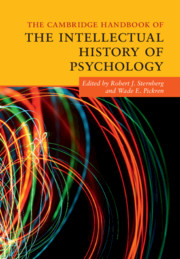Book contents
- The Cambridge Handbook of the Intellectual History of Psychology
- The Cambridge Handbook of the Intellectual History of Psychology
- Copyright page
- Contents
- Figures
- Tables
- Contributors
- Introduction
- 1 Major Paradigms and Approaches in Psychology
- 2 Methodology in Psychology
- 3 Neuroscience in Psychology
- 4 Sensation and Perception
- 5 Attention: Awareness and Control
- 6 Learning
- 7 Memory
- 8 Decision-Making
- 9 Creativity
- 10 Intelligence
- 11 Development
- 12 Social Psychology
- 13 Gender
- 14 Emotion
- 15 Motivation
- 16 Personality
- 17 Abnormal Psychology
- 18 Psychotherapy
- 19 Health Psychology
- Index
- References
4 - Sensation and Perception
Published online by Cambridge University Press: 18 May 2019
- The Cambridge Handbook of the Intellectual History of Psychology
- The Cambridge Handbook of the Intellectual History of Psychology
- Copyright page
- Contents
- Figures
- Tables
- Contributors
- Introduction
- 1 Major Paradigms and Approaches in Psychology
- 2 Methodology in Psychology
- 3 Neuroscience in Psychology
- 4 Sensation and Perception
- 5 Attention: Awareness and Control
- 6 Learning
- 7 Memory
- 8 Decision-Making
- 9 Creativity
- 10 Intelligence
- 11 Development
- 12 Social Psychology
- 13 Gender
- 14 Emotion
- 15 Motivation
- 16 Personality
- 17 Abnormal Psychology
- 18 Psychotherapy
- 19 Health Psychology
- Index
- References
Summary
Sensory science began with the Greek philosophers (back to 600 BC). One early view: sensory experience is a faithful reflection of the physical world. As history swept through the Roman Empire, the fall of Rome and the transfer of science to Arabic scholars, sensory science as we know it had to await Andreas Vesalius and human dissections in the sixteenth century. Luigi Galvani’s animal electricity (eighteenth century) ushered in the scientific explosion of the nineteenth century that brought us Johannes Müller (doctrine of specific nerve energies) and the birth of psychology in the laboratory of Wilhelm Wundt (1879). Advances rapidly showed how information from each of our senses is processed through the nervous system; contrary to the Greeks, our perceptions are not always a faithful reflection of the physical world. Just as with physical science, sensory science requires measurement. Gustav Fechner argued that the unit of sensation is the jnd (the just-noticeable difference a stimulus must be increased for a person to detect a difference). This view held for a century until S. S. Stevens noted all jnds did not appear to be equal. He revolutionized the study of sensory and perceptual experience, and that revolution continues today.
Keywords
- Type
- Chapter
- Information
- Publisher: Cambridge University PressPrint publication year: 2019

